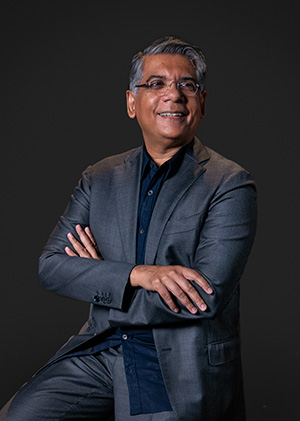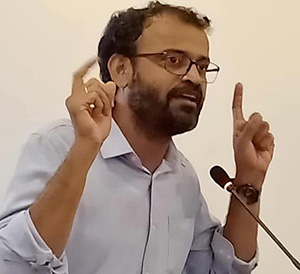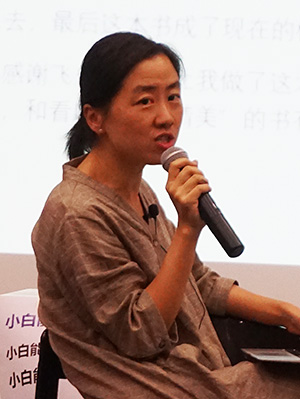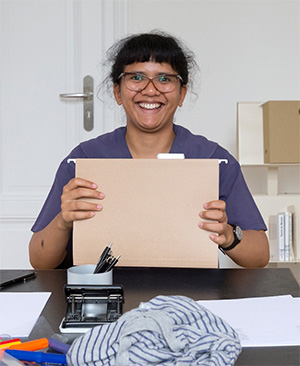Cultural Precarities: Reading Independent Art Collectives and Cultural Networks in Asia
Cultural Precarities: Reading Independent Art Collectives and Cultural Networks in Asia is an In Situ Graduate School (ISGS) held online in 2021. Organised by the International Institute for Asian Studies (IIAS, Leiden), LASALLE College of the Arts (Singapore) and KUNCI: Forum & Collective (Yogyakarta), this ISGS aimed to study the increasingly vibrant cultural networks and artist collectives in Asia, which are becoming vital nodal points for cultural, social, creative and political intersections in contemporary societies.
Dr Venka Purushothaman, co-organiser and co-convenor, reflected on the ISGS journey in IIAS The Newsletter.
Originally conceived as a weeklong on-site study in Yogyakarta, Indonesia, in 2020, it had to pivot to an online programme spread over ten months. The three groups' final presentations in December 2021 discussed the collectivism essaying into the personal, existential and the world to be. The participants presented a new way of envisioning collectivism through a rich palimpsest of storytelling, podcast conversations, interviews, moving images and performances. Also a selected list of Collectives was presented at the meeting.
A selection of the presented work is available below.
Cultural networks and artist collectives are increasingly becoming key nodal points for cultural, social, creative and political intersections in Asia. Long established as a system of cultural and social enterprise for the nurturing of counter-cultural discourse (Guerilla Girls, Fluxus), self-help networks (ELIA, ENCATC, CILECT), artist collectives and cultural networks, have remained discrete and independent of each other.
Recent trends in Asia, however, reveal that cultural networks and artist collectives symbiotically meet and inform each other. Networks in Asia are a composite of artist collectives, local/national institutional/inter-governmental agencies and foreign agency led initiatives. Networks such as the Mekong Cultural Hub, Cambodia and Taiwan (MCH); West Heavens , China and Hong Kong; Asia-Pacific Network for Culture, Education and Research, Singapore (ANCER); KUNCI Study Forum and Collective, Indonesia (KUNCI); Tokyo Performing Arts Meeting, Japan (TPAM), to name a few, demonstrate an increasing need to develop an inclusive methodology of work between artists and their communities. Moreover, artist collectives such as Taring Padi (Indonesia), Vertical Submarine (Singapore) and Jiandyin (Thailand) among others, function as cultural intermediaries engaging with communities, governments or government-linked agencies to advocate for cultural inclusivity in economic and social development and to facilitate artist mobility across other networks and collectives.
This ISGS invites, artists, social sciences and humanities graduate students (doctoral and research master's), independent researchers, cultural practitioners and 'artivists' to deliberate on the various intersections of artistic practice and networks and to foster dialogue on the emergence of independent cultural networks in Asia. This ISGS calls for the necessary and vital understanding of ‘flow’ between networks and within networks, their short-lived, ‘precarious’ character, and above all, their situatedness within communities. Participants will exchange and deliberate on the following:
- What are the features of contemporary networks in Asia (and beyond) and how do they express emerging artistic practices?
- Do networks cultivate a unique aesthetics for art practitioners?
- To what extent do independent art collectives offer an alternative framework for social, economic and political engagement?
- Can collectives be thought of as substitutes to established institutions (e.g. museums, galleries, universities) or as complementary partners?
- Is a critical theorisation of networks and collectives plausible outside of the professional and applied work of arts and cultural management?
- Do networks contribute to the precarity of cultural labour or do they reflect an aspiration to unmoor from neoliberal and (often) authoritarian social contexts?
This ISGS aims to establish a critical reading of current developments in art networks in Asia thereby contributing to a body of emerging works. ‘Conversations’ with artists and cultural activists will be a key method of inquiry for the participants, so as to develop an appreciation of the complex inter-relatedness between art, history and politics.
In addition to lectures, participants will be encouraged to conduct group projects and undertake field trips to critical sites in Yogyakarta. At the end of the ISGS, participants will make final presentations responding to the theme and questions raised in this study.
Venka Purushothaman (Singapore), Dev Nath Pathak (India), Chen Yun (China) and Syafiatudina (Indonesia) will convene the ISGS with a series of studies in practice, using the environment of the city of Yogyakarta and its rural surroundings where many Indonesian networks and collectives are located. Participants will be exposed to a range of artists, local art spaces and sites of cultural engagement to test their methods and practices, enabling them to undergo a critique of their personal research projects in this field. The conveners and participants will function as co-learners to develop new paradigms to appreciate the developing field.
Application is closed

Venka Purushothaman (Singapore) is an award-winning art writer and academic with a distinguished career in arts and cultural industries in Singapore. Currently Provost at LASALLE College of the Arts, Singapore, he holds a PhD in Cultural Policy and Asian Cultural Studies from The University of Melbourne. Venka has researched and published extensively on contemporary art, cultural policy and festival cultures. His books on culture, Making Visible the Invisible: Three Decades of the Singapore Arts Festival (NAC, 2007), and Narratives: Notes on a Cultural Journey, Cultural Medallion Recipients, 1979-2002 (NAC, 2002) remain the most comprehensive studies of the festivals and artistic practices in Singapore. As an art writer, Venka has written essays on numerous artists including Pierre & Gilles (France), Nathalie Junod Ponsard (France), Parvati Nayar (India) and Salleh Japar (Singapore). His artist monograph, The Art of Sukumar Bose: Reflections on South and Southeast Asia (ISEAS, 2013) was awarded the Best Art Book Accolade by the ICAS Book Prize 2015. He is currently the editor of Issue, an annual international art journal, published in Singapore, which curates essays, exhibitions and interviews by artists, scholars and curators. Venka was Visiting Research Fellow at Trinity College Dublin (2017-2018) and is currently University Fellow at Musashino Art University, Tokyo. Venka’s interest in networks led him to found the Asia-Pacific Network for Cultural, Education and Research (ANCER) in 2010 to develop conversations around emerging trends in contemporary culture in Asia.

Dev Nath Pathak (India) is founding faculty of the Sociology department at South Asian University, a university of SAARC in New Delhi (India). He has a doctorate in Sociology from Jawaharlal Nehru University and his research interests consist broadly of cultural politics and performances in South Asia. He has contributed articles to various journals, chapters in edited books, and he is Reviews Editor & Editorial Member with the journal ‘Society and Culture in South Asia’ (Sage), as well as on the editorial board of ‘Journal of Human Values’. A few of his recent publications include: Living and Dying: Meanings in Maithili Folklore (2018), Another South Asia (2017), Culture and Politics in South Asia: Performative Communication (2017); Intersections of Art, Anthropology and Art History: A Conversation with Parul Dave-Mukherji (2016) & Narrating Nations, Performing Politics: A Conversation with Vasudha Dalmia (2017), Decoding Visual World: Intersections of Art, Anthropology and Art History in South Asia (2019), Against Nation: Thinking Like South Asian (2019). In addition, he has curated an exhibition of contemporary Sri Lankan art at India International Centre and contributed to the discussion on the art project Tale of Two Cities (Delhi edition). He was a visiting scholar at Brown International Advance Research Institute, at Brown University (2013), a Charles Wallace fellow at Queen’s University Belfast (2015), a visiting scholar at Indian Institute of Advance Studies, Shimla (2016), and scholar-in-residence at Indian Institute of Management, Calcutta (2019).
 Chen Yun (China) is a curator and researcher. Chen Yun studied Journalism at Fudan University and got her MPhil degree in Communication at The Chinese University of Hong Kong. She has been working in contemporary art institutions since 2007 in Shanghai and Beijing. After working at Ullens Centre for Contemporary Art as assistant curator for art and education programmes, she came back to Shanghai in 2009. Since 2010, she joined West Heavens, a cross-cultural exchange programme as researcher and project manager. She has curated more than 100 talks, performances, workshops and social events. She was a member of the curatorial team for the 11th Shanghai Biennale (2016-17) and curated 51 Personae, a public programme series that revealed the transformational potential of 51 persons/groups in Shanghai. 51 Personae grew out of her initiation of the Dinghaiqiao Mutual Aid Society (2015-18), a self-organized venue for studies, communication, reflection, and social services, in a working class/migrant neighbourhood of Shanghai. She won the first prize of the PSA Emerging Curators Project in 2014 by curating Dinghaiqiao: Art Practice into History exhibition in Power Station of Art, Shanghai. She organizes and co-edits publications for West Heavens, as well as independent publication projects via 51 Personae.
Chen Yun (China) is a curator and researcher. Chen Yun studied Journalism at Fudan University and got her MPhil degree in Communication at The Chinese University of Hong Kong. She has been working in contemporary art institutions since 2007 in Shanghai and Beijing. After working at Ullens Centre for Contemporary Art as assistant curator for art and education programmes, she came back to Shanghai in 2009. Since 2010, she joined West Heavens, a cross-cultural exchange programme as researcher and project manager. She has curated more than 100 talks, performances, workshops and social events. She was a member of the curatorial team for the 11th Shanghai Biennale (2016-17) and curated 51 Personae, a public programme series that revealed the transformational potential of 51 persons/groups in Shanghai. 51 Personae grew out of her initiation of the Dinghaiqiao Mutual Aid Society (2015-18), a self-organized venue for studies, communication, reflection, and social services, in a working class/migrant neighbourhood of Shanghai. She won the first prize of the PSA Emerging Curators Project in 2014 by curating Dinghaiqiao: Art Practice into History exhibition in Power Station of Art, Shanghai. She organizes and co-edits publications for West Heavens, as well as independent publication projects via 51 Personae.
 Syafiatudina (Indonesia) works as a writer and curator. Her artistic practice has been formed by her explorations on various issues regarding social movements, the problem of work, collectivity, the formation of political subjects, and critical pedagogy. Dina is a member of KUNCI - a collective for research-action and publishing in Yogyakarta. KUNCI experiments with methods in producing and sharing knowledge through the act of studying together at the intersections between affective, manual and intellectual labour. Since its founding in 1999 in Yogyakarta, Indonesia, KUNCI has been continuously transforming its structure, ways and medium of working. Initially formed as a cultural studies study group, at present KUNCI’s practices focus on collectivizing study, by way of space-making, discussion, library, research, publishing, press and school-organizing. KUNCI traverses and connects institutional, disciplinary and local boundaries. KUNCI’S membership is based on friendship and informality, as well as self-organized and collaborative principles.
Syafiatudina (Indonesia) works as a writer and curator. Her artistic practice has been formed by her explorations on various issues regarding social movements, the problem of work, collectivity, the formation of political subjects, and critical pedagogy. Dina is a member of KUNCI - a collective for research-action and publishing in Yogyakarta. KUNCI experiments with methods in producing and sharing knowledge through the act of studying together at the intersections between affective, manual and intellectual labour. Since its founding in 1999 in Yogyakarta, Indonesia, KUNCI has been continuously transforming its structure, ways and medium of working. Initially formed as a cultural studies study group, at present KUNCI’s practices focus on collectivizing study, by way of space-making, discussion, library, research, publishing, press and school-organizing. KUNCI traverses and connects institutional, disciplinary and local boundaries. KUNCI’S membership is based on friendship and informality, as well as self-organized and collaborative principles.
Project Advisors and Coordinators:
Adam Knee (LASALLE), Mitha Budhyarto (LASALLE), Philippe Peycam (IIAS), Martina van den Haak (IIAS)
A Conversation
Corrie Tan, Claudia König, Dana Chan, convenor Syafiatudina
In the recording Corrie Tan, Claudia König and Dana Chan discussed with co-convenor Syafiatudina about various forms of inquiries and initiatives which emerged out of precarious conditions of work and life. We are looking for resonances by mirroring our reflections.
Precarious Times: A Storytelling Approach
Khayal Trivedi, Ahmed Abid Khan, convenor Chen Yun
Ahmed Abid narrates in his Masked Memo about the challenges he faced during the pandemic and the meaning of masks during this enduring period. Khayal Trivedi reflects on cultural networks and his own experience in precarious times.
Within the Ring of Fire: Regional Collective Work on Mutual Aid, Cultural Histories, and Precarity
Neel Banerjee, Erin Wilkerson, Alex Tam, Kenneth Tay, Zoénie Deng, Linda Kencana, convenor Dev Pathak
The Pacific Ring of Fire, encircling eastern Asia and Australia, as well as western America, produces the majority of the world’s earthquakes, wildfires, and volcanic activities due to its proximity to tectonic plates. This group approached the ISGS theme from the notion Ring of Fire. Read the full text here.
A Virtual Ramayana Joint Performance of Khon and Balinese Sendratari
Anak Agung Lindawati Kencan
The Covid-19 pandemic has led to new forms of racism and xenophobia against different groups, such as a rise in anti-Asian attacks reported in many countries which linked to the first cases of the virus found in the Chinese city of Wuhan. New practices of intercultural engagement and solidarity come to the fore on account of “creative individual and collective initiatives” as the global responses to the pandemic (UNESCO 2020 ). To promote intercultural dialogue in the emerging crisis, “The Progressive Artist Collective” which engaged three dance troupes from Thailand and Indonesia: Rojaradrit Troupe Thailand, Balinese Gamelan and Dance Çudamani, and Nakula Sadewa Dance of Indonesia collectively presented a Ramayana episode of “Rama and Maricha the Golden Deer.” The virtual performance was streamed live on the digital platform of social media Facebook on December 10th, 2021. The fundamental element of this Virtual Ramayana Joint Performance lies in the narratives of the Ramayana epic as the core stories of Khon and Balinese Sendratari. The “universal language” of Ramayana can be understood by culturally diverse performers and audiences. The application of digital technologies in creating and presenting the collective dance signifies challenges and opportunities in promoting intercultural dialogue in the wake of the Covid-19 pandemic.
The Smoke Rides on the Wind
Erin Wilkerson
Histories of global oil extraction and movement entangle with stories of colonial settlement and threatened ecologies. An autoethnographic fieldwork on erasure and displacement. Filmed on site in California and Singapore, situated within the regional Ring of Fire.
Cutting Sparks
Zoénie Liwen Deng
This semi-ekphrasic poem is a visual-textual conversation with the woodcut printing movements across Asia, with their temporalities and spatialities. The issues these movements try to address are different, but intermeshed—how to live and practise otherwise. The beautiful thing about collective woodcut print making is the embodied and inter-bodied togetherness, which is a connecting tissue in cultural-social-political movements. This is beyond what words in this poem can capture.
READ: Cutting Sparks
Disclaimer
"[C] Images and text to individual contributors unless otherwise specified. Views and artistic approaches expressed in the works are the contributors' own and not of the organising or publishing institutions. Every reasonable care has been taken by the contributors to ensure accuracy of the information within and every effort has been made to obtain permissions from copyright owners. In cases where this has not been possible, owners are invited to notify the contributors directly."
The 2021 ISGS on Cultural Precarities: Reading Independent Art Collectives and Cultural Networks in Asia is co-organised by The International Institute for Asian Studies, the Netherlands & LASALLE College of the Arts, Singapore.
The International Institute for Asian Studies (IIAS) is a global humanities and social sciences research institute and knowledge exchange platform that supports programmes which engage Asian and other international partners. Aiming to contribute to a more integrated understanding of present-day Asian realities as well as to rethink 'Asian Studies' in a changing global context, IIAS works to encourage dialogue and link expertise, involving scholars and other experts from all around the world in its activities. IIAS thus acts as a global mediator, bringing together academic and non-academic institutes in Asia and other parts of the world, including cultural, societal and policy organisations. IIAS adopts a thematic approach to the study of Asia, fostering research that, by its nature, transcends disciplinary and regional boundaries. The three research foci of IIAS are Asian cities; the uses of culture and cultural heritage; and Asia’s projection into the world and intra-Asian connections. In addition, IIAS remains open to other possibly interesting areas of investigation.
In addition to supporting international research networks and programmes, IIAS organises different types of academic events throughout the year, many of them in Asia. These include conferences, workshops and seminars, as well as thematic roundtables and Summer/Winter Schools for PhD students. IIAS runs an international fellowship programme and a publication and publishes ‘The Newsletter’, its free periodical on Asian Studies which enjoys a worldwide readership of 50,000. IIAS hosts the secretariat of various networks, including the International Convention of Asia Scholars (ICAS) and the European Alliance for Asian Studies. All of these activities are based on international cooperation. It is this fundamentally collaborative and inclusive nature that has allowed IIAS to become the most global research-led meeting ground in the field of Asian Studies.
LASALLE College of the Arts is Asia’s leading tertiary institution in contemporary arts and design education and practice. The College provides a nurturing, interdisciplinary learning environment to inspire the next generation of forward-looking, globally engaged artists, designers and leaders of creative industries.
Its faculty is led by a community of award-winning artists, designers, educators and researchers, and their practice-led research sets LASALLE apart as an international centre of excellence.
LASALLE is a non-profit private educational institution founded in 1984 by the late De La Salle Brother Joseph McNally, a visionary artist and educator.
See www.lasalle.edu.sg for more information.
The ISGS will be hosted by Kunci Study Forum and Collective. KUNCI experiments with methods in producing and sharing knowledge through the acts of studying together at the intersections between affective, manual and intellectual labour. Since its founding in 1999 in Yogyakarta, Indonesia, KUNCI has been continuously transforming its structure, ways and medium of working. Initially formed as a cultural studies study group, at present KUNCI’s practices emphasize on collectivizing study, by way of making-space, discussion, library, research, publishing, press and school-organizing. KUNCI traverses and connects institutional, disciplinary and local boundaries. KUNCI’S membership is based on friendship and informality, as well as self-organised and collaborative principles. Members of KUNCI are Antariksa (founder), Brigitta Isabella, Ferdiansyah Thajib, Fiky Daulay, Gatari Surya Kusuma, Hayyu Al Qayyumi, Nuraini Juliastuti (founder), Rifki Akbar Pratama, Syafiatudina, and Verry Handayani.
See www.kunci.or.id for more information.